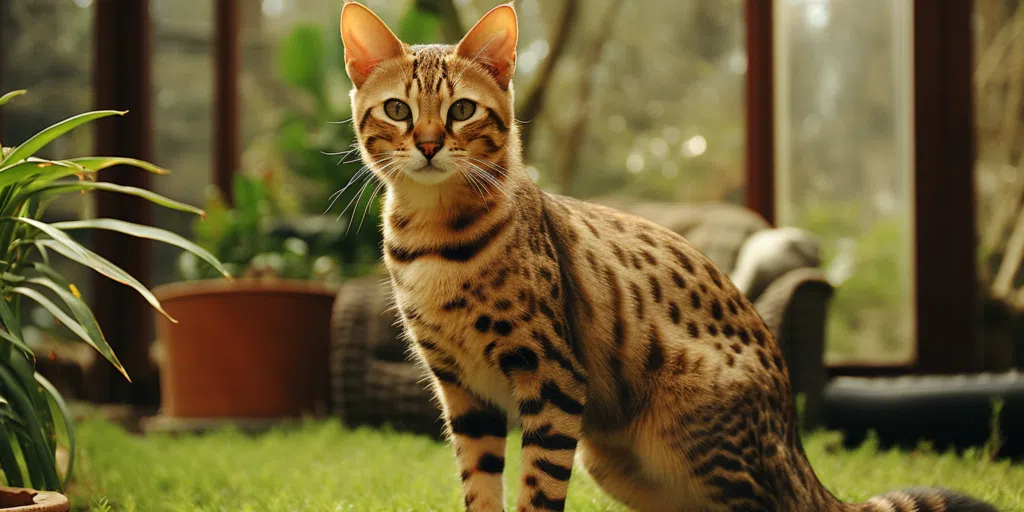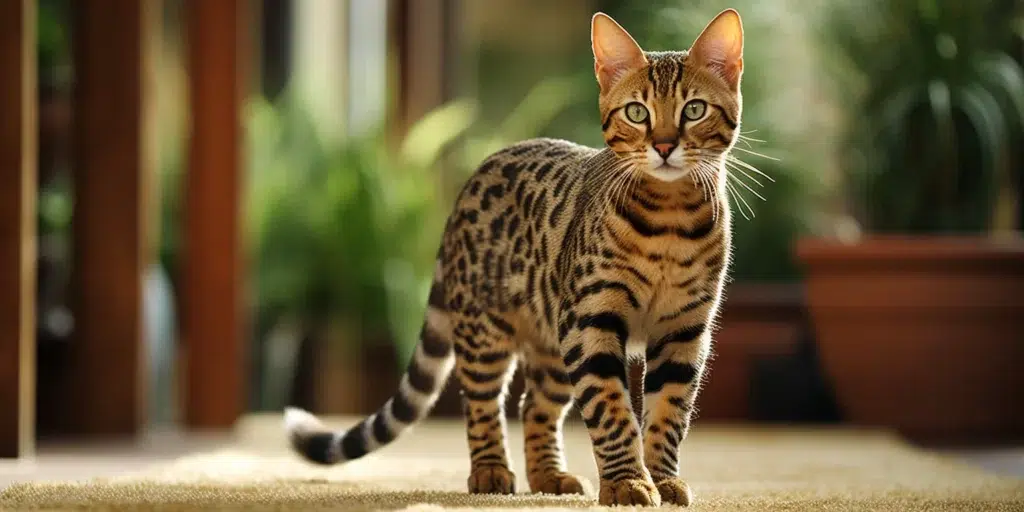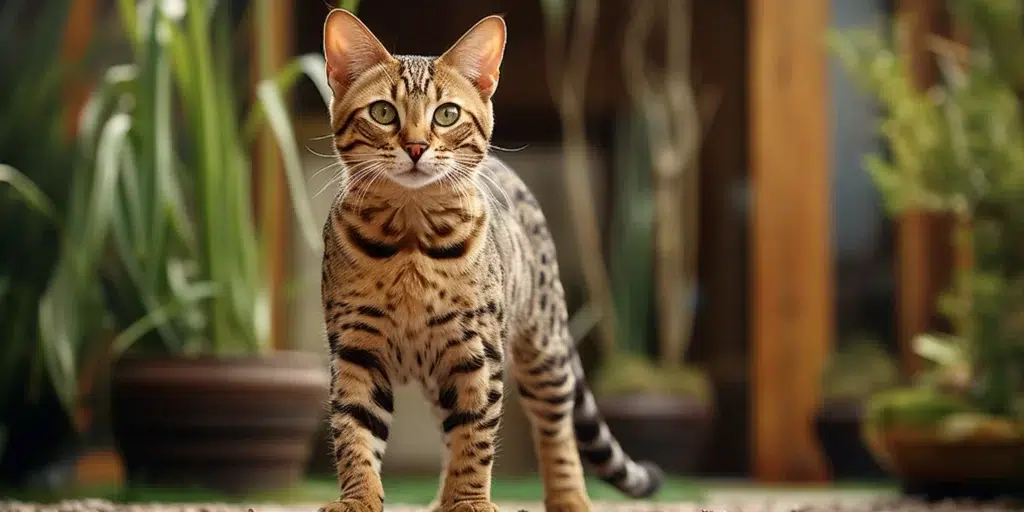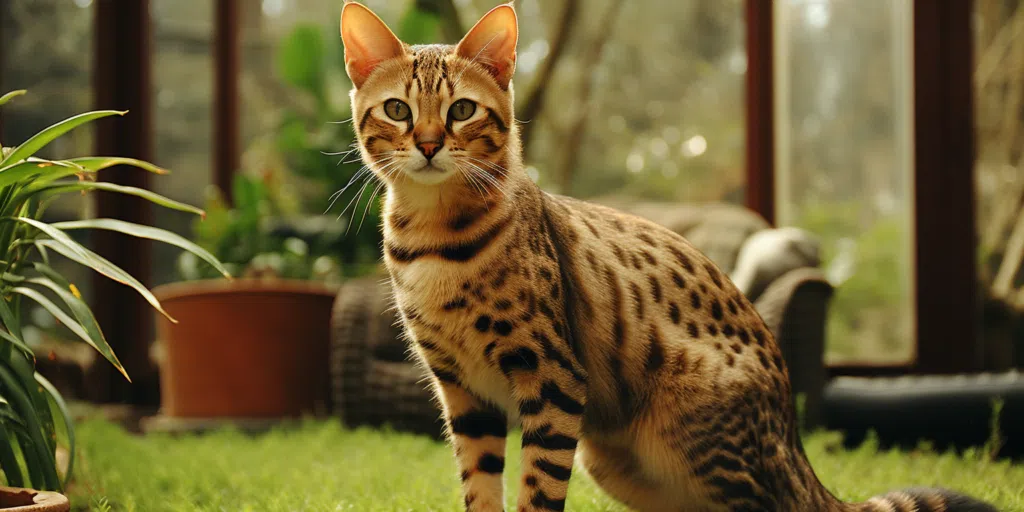Savannah cats are one of the most beautiful and exotic breeds that cat lovers can own. Their striking appearance and dynamic personality make them a fascinating addition to any household. But, have you ever wondered about the sounds and noises these majestic creatures make?
If so, you’re in the right place! In this blog, we will dive deep into the world of Savannah cat vocal noises. From their unique ways of communicating to understanding what each sound means, get ready to become an expert on Savannah cat noises.
Savannah cats are known for their exceptional communication skills, which are not limited to just meowing like most domestic cats. They have a wide range of sounds they use to express themselves, including purring, hissing, chirping, and even tapping with their paws. Their ability to produce a variety of vocalizations is a trait inherited from their wild ancestor, the African serval.
This not only makes them unique but also highlights their advanced communication skills compared to other cat breeds. Whether they are trying to tell you they’re hungry, scared, or just want some attention, understanding the nuances of Savannah cat vocal noises can greatly enhance your relationship with your feline friend.

Are Savannah Cats Vocal Cats?
Yes, Savannah cats are indeed vocal cats. Their communicative prowess is significantly influenced by various factors, including gender, individual temperament, and activity level.
Female Savannah cats tend to be quieter than their male counterparts, although this is not a hard and fast rule. It’s more about the individual personality of each cat. Some Savannahs might choose to express themselves more through body language rather than vocalizing.
However, when they do decide to use their voice, it’s a rich mixture of sounds that can be both enthralling and puzzling to their human companions.
Factors That Influence Savannah Cat Noise Levels
Not all Savannah cats are vocal in the same way or to the same extent. Just like people, each cat has its unique personality. Some might be more reserved and only vocalize when necessary, while others could be the feline equivalent of chatterboxes, constantly meowing, chirping, or hissing to express themselves or catch your attention.
Activity and exercise levels also play a significant role in how vocal Savannah cats are. Cats that have plenty of stimulation and physical activity tend to use their energy exploring and playing, which might result in them being less noisy.
On the other hand, a bored Savannah cat might become more vocal, perhaps in an attempt to express their dissatisfaction or to call for attention and stimulation.
Their Age
Age is a critical factor in the vocal behavior of Savannah cats. Kittens are naturally more vocal than adult cats as they use meowing to communicate their needs to their mother. As they grow older, Savannah cats tend to vocalize less for attention and more for specific reasons, such as communicating discomfort or expressing greetings.
In the transition from kittenhood to adulthood, Savannah cats develop a more sophisticated set of vocalizations. The range of sounds they produce can become more refined as they age, with each type of sound serving a specific purpose in their communication arsenal.
Senior Savannah cats may experience changes in their vocalizing habits due to health reasons or changes in their environment. It’s essential to pay attention to these changes as they can sometimes indicate underlying issues that may need a vet’s attention.

Feeding Savannah Cat and Its Relation to Noise Levels
Feeding time is a prime time for Savannah cats to become vocal. They may meow or chirp to remind their humans that it’s time to eat or express their excitement about getting their favorite dish. This behavior can vary from one Savannah to another, with some being more insistent and vocal than others.
Consistent feeding schedules can help manage the levels of noise your Savannah cat makes around meal times. Knowing that they will be fed at certain times each day can reduce anxiety and the need for them to vocalize their hunger.
Interestingly, the type of food and the way it’s presented can also affect their vocalizations. For example, a Savannah cat who enjoys interactive feeding toys might be quieter as they’re focused on the activity of getting their food.
Savannah Cat Exercise Level Affects Their Noise Levels
Exercise and play are vital for keeping a Savannah cat happy and healthy. Cats with ample opportunities to burn off their energy through play are generally less vocal. This is because they use their physical activities as a primary form of expression and communication.
On the flip side, a Savannah cat that doesn’t get enough physical activity may become more vocal. This increase in noise level can be a form of expressing boredom or dissatisfaction with their current activity level.
Incorporating regular playtime and exercise into your Savannah cat’s routine not only keeps them fit but can also contribute to a more harmonious and quieter home environment.
Medical Conditions
Medical issues can also influence a Savannah cat’s vocalizations. If your cat suddenly becomes more vocal or changes their tone, it could be a sign of discomfort or pain. This highlights the importance of being attuned to changes in your cat’s normal vocal patterns.
Some medical conditions can affect a cat’s ability to vocalize as they usually would. For example, respiratory infections can change the sound of their meow, making it more crucial than ever to listen closely to what your Savannah cat is trying to tell you through their noises.
Regular check-ups with a veterinarian can help ensure that any health-related causes of increased vocalization are identified and addressed early, ensuring your Savannah cat remains happy, healthy, and comfortable.

Savannah Cat Noises and Their Meaning
Understanding the different noises a Savannah cat makes is essential for a harmonious living situation. Each sound has its own meaning, and by deciphering these, you can better respond to your cat’s needs and emotions.
Meow (The Most Common Noise)
The meow is perhaps the most recognized cat noise, and Savannah cats use it in various ways. From a greeting when you come home to a demand for food or attention, the meow is a versatile sound in the Savannah cat’s communication toolkit.
Different meows can have different meanings based on their tone, pitch, and length. A short, high-pitched meow might be a greeting, while a longer, drawn-out meow could indicate frustration or demand.
Paying attention to the context in which your Savannah cat meows can provide clues about what they’re trying to communicate, enhancing your understanding of their needs and strengthening your bond.
Purring (The Most Enjoyable Cat Noise)
Purring is often associated with contentment and happiness in cats, and this holds true for Savannah cats as well. When your Savannah cat purrs while curled up in your lap, it’s a sign they feel safe and loved.
However, it’s important to note that cats also purr when they’re in pain or distress as a self-soothing mechanism. Observing the situation in which your Savannah cat purrs can help you determine the cause of their purring.

Hissing (Your Cat Feels In Danger)
Hissing is a defensive noise made by Savannah cats when they feel threatened or scared. It’s their way of saying, “Back off!” If your cat hisses, it’s essential to give them space and try to identify and remove the cause of their distress.
Yowl (Not a Happy Meow)
A yowl is a loud, drawn-out vocalization that usually indicates your Savannah cat is upset or in distress. It can be a sign of discomfort, territorial disputes, or a call for attention. Understanding the context of a yowl can help you address your cat’s needs more effectively.
Growls (Not as Scary as a Tiger)
Growling is another defensive noise, indicating fear, discomfort, or territoriality. While it might sound scary, it’s important to respect your Savannah cat’s feelings and give them space to calm down.
Some Cats are More Talkative Than Others
Personality plays a huge role in how vocal a Savannah cat is. Some cats naturally enjoy “talking” and being vocal, while others might be more reserved. Recognizing and respecting your Savannah cat’s unique personality is key to a happy coexistence.
How to Make Savannah Cat Less Vocal?
If your Savannah cat’s vocalizations become overwhelming, there are a few strategies you can try to reduce their noise level. Ensuring they have enough playtime, maintaining a consistent routine, and providing plenty of affection can help keep your cat happy and potentially quieter.

Conclusion
Savannah cats are incredibly vocal and expressive animals, with a wide range of noises they use to communicate. Understanding these vocalizations can deepen your bond with your Savannah cat and help you meet their needs more effectively.
Remember, a happy Savannah cat is often a quieter one, so prioritizing their well-being is key. Whether through play, exercise, or learning the nuances of their language, being attentive to your Savannah cat will make life together more harmonious and enriching for both of you.